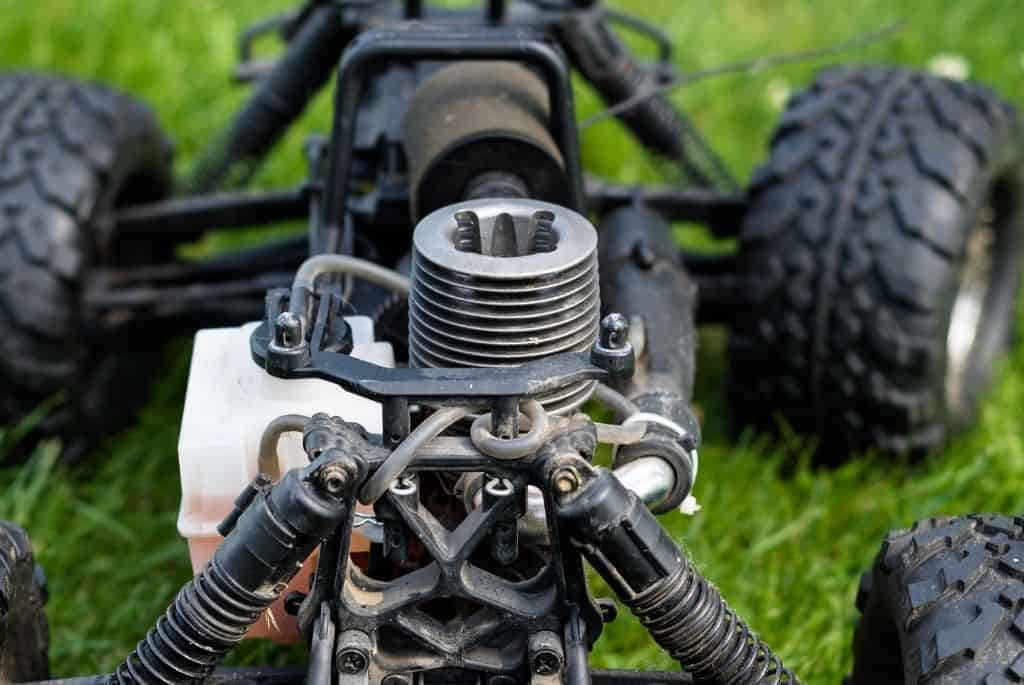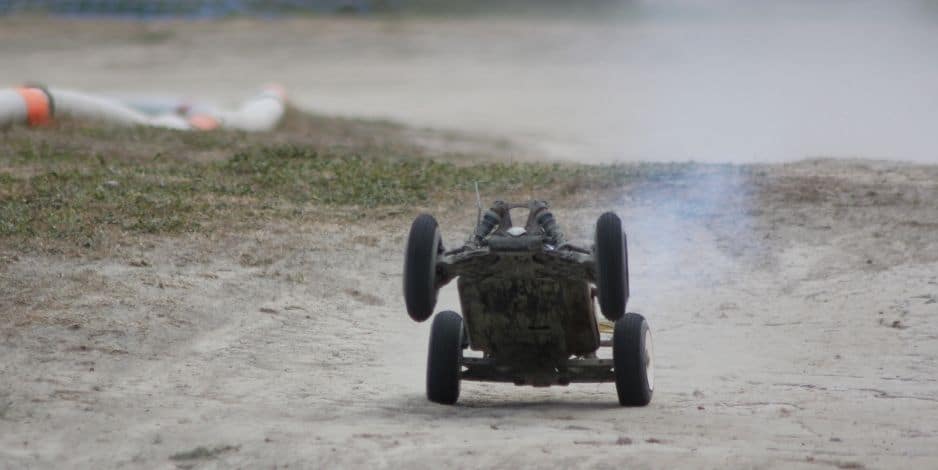RC vehicles are not just mere toys to their devotees. It’s a holy grail to the enthusiasts. If you are trying to step into the RC genre, you might wonder about RC nitro engines’ lifespan. And I admire your thought process because RC vehicles pack a wallop through their lifetime in racing and other competitions. So, how long will an RC engine last actually?
RC Nitro engines usually last 6-8 gallons. This means that an RC Nitro engine shall burn a total of 6-8 gallons of fuel in its entire lifetime. With utmost care, you can get as high as 10 gallons from basically any model you own. You can expect 40 to 70 hours of total runtime from your RC nitro engine.
There are some basic tips on how to increase RC engines’ lifespan. Knowing what affects the lifespan is also pivotal. These pieces of knowledge are very crucial and you should bear these in mind for the entire time you own an RC vehicle.

I am going to talk about all of these in a brief but explicit manner in the rest of this article so let’s get started.
Factors Affecting the Lifespan of an RC Nitro Engine
There are some common factors that affect the lifespan of every engine. These factors are given below:
Moisture
Moisture is the main enemy of nitro engines. One of the main ingredients of the nitro engine fuel mixture is methyl alcohol or methanol. It can burn in the presence of air. But at the same time, it is very hygroscopic.
The term hygroscopic means it can absorb moisture from the air. Methanol draws moisture from the air that gets mixed in while running the engine. It can cause different parts of the engine like the crankcase, and the connecting rods to rust. And as a result, the lifespan of your RC nitro engine decreases significantly.
Quality of The Lubrication Oil
The fuel for nitro engines is mainly composed of three different ingredients- nitromethane, methanol, and lubricating oil.
In an engine, there are lots of rotating parts. And as these parts are rotating, they will start to wear due to friction. The main purpose of lubricating oil is to make all the parts run smoothly and reduce engine wear.
Lubricants have a higher flash point and are resistant to breaking down even at extreme temperatures. In the past, hobbyist RC racers used to use castor oil as the lubricating oil in their nitro engine fuel recipe. It has good lubrication properties but it leaves a gummy castor polymer residue.
But nowadays people are using synthetic lubricating oils as they have better lubrication qualities and don’t leave a residue.
The concentration of lubricating oil in the fuel mixture can vary depending on the usage purpose.
For RC racers, their main priority is engine power. As a result, their fuel is going to contain less amount of lubricant so that the engine can get the most amount of methanol and nitromethane mixture. Typically, the concentration is around 8-12%. But for general use, the concentration of lubricant can be as much as 20% or more.
Less lubricant concentration means that the engine will wear much faster. And as a result, its lifespan will decrease significantly.
Fuel Mixture
Fuel mixture is another factor that influences the lifespan of nitro engines. A lean mixture can make it overheat. This can cause the engine parts to fail, consequently reducing the lifespan of your nitro engine.
Too rich fuel mixture is also bad. It can decrease the efficiency of the engine as excessive unburnt fuel will come out of the exhaust.
As mentioned before, nitro engine fuel contains methanol, nitromethane, and lubricant oil. Among them, nitromethane is highly explosive.
If the concentration of nitromethane in the fuel is too high, it can cause abnormal combustions inside the engine.
Check out my article: Nitro Fuel 20 vs 30?
It will produce excessive heat and pressure inside the combustion chamber. This can potentially damage the parts of the engine and eventually lead to engine failure.
Tips to Increase the Lifespan of an RC Nitro Engine

Radio-controlled nitro engines offer a tremendous amount of speed and performance in a small package. However, their operating tolerance is very tight. This is why you will need to take extra care of your engine to avoid any sort of premature demise.
For that reason, I’ve shared some tips that you can use to increase the lifespan of your nitro engine. These tips are given below:
Perform After-Run Maintenance
After-run maintenance is essential for increasing the lifespan of nitro engines. To perform after-run maintenance, follow the steps below.
1. First, empty the fuel tank by drawing out unused fuel in a bottle.
2. Once you have emptied the fuel tank, try starting the engine and run in the idle position. In this way, you will be able to burn the left-over fuel in the engine crankcase and the fuel line. Leaving fuel inside the engine is never a good idea. Once all the left-over fuel is burnt, the engine will idle up for a split second and then stall.
3. Clean the engine case thoroughly. As you are going to operate your vehicle outdoors, dirt will build up in the engine and your vehicle’s chassis.
Use compressed air, spray bottle, small brushes, denatured alcohol, or other RC-specific cleaners for that purpose. While cleaning, always use gloves and safety goggles to ensure your safety.
4. When the engine is clean and dry, remove the air filter and glow plug.
5. Remove the engine air filter and other air filter components from the filter housing. Clean the components with detergent or soapy water and dry them completely after washing. After drying, apply air filter oil into the components and reinstall them.
It is recommended to clean air filter components after every thirty-minutes runtime to maximize the lifespan of your engine. Especially if you are operating your RC vehicle in a dusty environment.
6. After re-installing the air filter components in the air filter housing, reinstall the glow plug.
Perform maintenance operation after every run of your RC vehicle. And if you are not going to use your RC vehicle for a long time, performing these maintenance procedures before storing them is essential for your engine’s safeguard. This can significantly increase the lifespan of your radio-controlled nitro engine.
Can a nitro RC car run on gas? Read my article covering this subject.
Keep the Engine Temperature within Design Limit
Traditional cars have a dedicated cooling and lubrication system that makes sure that the engine will run under design temperature. But RC nitro engines have no such system. As a result, it is very easy for them to become overheated. This can eventually melt different engine parts, thus damaging your engine.
The operating temperature range of a nitro engine varies depending on the model and the manufacturer. You can find out your engine’s temperature limit from the manual provided by the manufacturer. Typically, the temperature range is around 105 to 125°C. If the temperature is above or below the design limit, it can have adverse effects on the engine.
Tuning the RC nitro engine is one way to keep its temperature under control. Nitro engine fuel contains a certain amount of lubrication oil. Use the high-speed needle valve to tune the lubricant content amount that your engine will be getting.
Never Run Engine Lean
This is important. Never run your engine with a lean mixture. It can cause serious damage to it by overheating. You should always use a slightly rich mixture to maximize your nitro engine’s lifespan.
Conclusion
The lifespan of your engine is entirely in your hand. If maintained and operated properly, RC nitro engines can last you a lifetime. On the other hand, without proper care, your engine will give out in a very short time.I hope that you’ve found this article “How long will an RC nitro engine last?” somewhat helpful. Thank you for stopping by!
